高中英语知识讲解 话题语言应用 --文学
高中英语必修——英美文学与文化知识

高中英语必修——英美文学与文化知识高中英语的必修课程中,英美文学与文化知识是一个非常重要的部分。
对于英语学习者来说,通过了解英美文学经典作品和相关的文化背景,可以更好地理解和掌握英语语言,同时也可以拓展自己的文化视野与知识面。
从文学角度来看,英美文学的历史可以追溯到中世纪,经历了文艺复兴、启蒙运动、浪漫主义、现代主义等历史时期,涵盖了众多优秀的文学作品和代表性的作家。
在高中英语课程中,我们将接触到一些著名的文学作品,如莎士比亚的《哈姆雷特》、《罗密欧与朱丽叶》、狄更斯的《双城记》、雨果的《悲惨世界》、奥威尔的《动物农场》等。
通过阅读这些作品,我们可以感受到不同时期的文学风格、主题和情感,领略到不同作家的思想、文化背景和才华。
此外,对于英美文学中的一些重要概念和文化现象也是需要了解的。
比如,布莱克的“天真诗派”以及其对浪漫主义文学的影响,爱默生的“个人主义”思想以及其对美国文化的影响,托马斯·金的“荒野”概念以及其与美国文化和民族精神的关系,还有一些与社会、政治、宗教等相关的文化现象和历史事件,如美国独立战争、南北战争、黑人奴隶制度、麦卡锡主义等。
理解这些文化现象,可以帮助我们更好地把握作品中的文化背景和内涵,在阅读和交流中更灵活自如地应用英语。
除了文学与文化的联系,英美文学也是英美文化中的重要组成部分之一。
通过了解英美文学的经典作品和文化背景,我们可以深入了解英美文化的特点、价值观和品质,比如英国的文化传统、美国的民主自由、个人主义和多元文化等。
这些文化特点和价值观不仅影响了当地的文艺创作和思想发展,而且也对世界各国的文学和文化产生了深远的影响。
如莎士比亚作为英国文学的代表人物,其作品不仅享誉英美,而且也被翻译成多种语言在全世界广泛传播。
此外,美国文化也是英美文学中的重要组成部分,如霍桑的《红字》、华盛顿·欧文的《神奇的旅程》等,都反映了美国文化的某些方面,同时也带动了美国文化在世界范围内的传播和影响。
高中英语:文学与作品分析
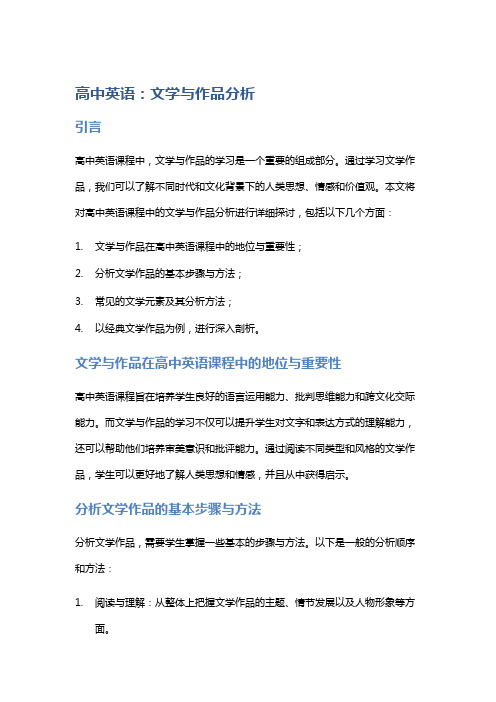
高中英语:文学与作品分析引言高中英语课程中,文学与作品的学习是一个重要的组成部分。
通过学习文学作品,我们可以了解不同时代和文化背景下的人类思想、情感和价值观。
本文将对高中英语课程中的文学与作品分析进行详细探讨,包括以下几个方面:1.文学与作品在高中英语课程中的地位与重要性;2.分析文学作品的基本步骤与方法;3.常见的文学元素及其分析方法;4.以经典文学作品为例,进行深入剖析。
文学与作品在高中英语课程中的地位与重要性高中英语课程旨在培养学生良好的语言运用能力、批判思维能力和跨文化交际能力。
而文学与作品的学习不仅可以提升学生对文字和表达方式的理解能力,还可以帮助他们培养审美意识和批评能力。
通过阅读不同类型和风格的文学作品,学生可以更好地了解人类思想和情感,并且从中获得启示。
分析文学作品的基本步骤与方法分析文学作品,需要学生掌握一些基本的步骤与方法。
以下是一般的分析顺序和方法:1.阅读与理解:从整体上把握文学作品的主题、情节发展以及人物形象等方面。
2.文学元素辨析:找出文学作品中使用到的各种元素,例如主题、情节、人物角色、背景环境等。
3.分析技巧应用:运用适当的分析技巧,如比喻、象征、对比等手法来解读文学作品。
4.文本细节研究:仔细观察并分析文学作品中的细节信息,包括语言的运用和描述方式等。
常见的文学元素及其分析方法在分析文学作品时,以下是一些常见的文学元素及其相应的分析方法:1.主题分析:通过抽丝剥茧地找出作品所要传达的主要思想或主题,并通过具体情节和人物形象支持论证。
2.人物角色研究:审视作品中不同人物角色的特点和心理活动,分析他们在故事中扮演的角色和意义。
3.比喻与象征分析:识别并解读文学作品中使用的比喻和象征手法,探究其隐含的意义与象征意义。
4.对比与冲突剖析:分析作品中存在的对比和冲突,探讨其反映了何种价值观念或思想观点。
经典文学作品的深入剖析在高中英语课程中,通常会涉及一些经典文学作品的研究与分析。
高三英语知识点:文学作品分析和阅读技巧

高三英语知识点:文学作品分析和阅读技巧文学作品是英语学习中不可或缺的一部分,它不仅能够提高我们的语言能力,还能够拓宽我们的文化视野。
在本篇文章中,我们将深入探讨高三英语文学作品分析和阅读技巧,帮助大家更好地理解和欣赏英语文学作品。
文学作品分析1. 主题分析主题是文学作品的核心,它表达了作者的观点和思想。
在分析文学作品的主题时,我们需要关注作品的背景、情节、人物和语言等方面,从中挖掘出作者想要传达的思想。
2. 人物分析人物是文学作品中的重要元素,通过对人物的塑造,作者展现了他们的性格特点和内心世界。
在分析人物时,我们要关注人物的言行举止、心理活动和与其他人物的关系,从而深入了解人物的性格和命运。
3. 情节分析情节是文学作品的发展脉络,它将人物、事件和背景紧密联系在一起。
在分析情节时,我们要关注情节的转折点、高潮和结局,从中体会作者的叙事技巧和艺术匠心。
4. 背景分析背景是文学作品的时代和环境,它对作品的主题、人物和情节都有重要影响。
在分析背景时,我们要关注作品的历史、地理和社会文化等方面,从而更好地理解作品。
5. 语言分析语言是文学作品的载体,它体现了作者的写作风格和艺术表现力。
在分析语言时,我们要关注作品的词汇、语法、修辞和句式等方面,从中感受作者的语言魅力。
阅读技巧1. 预览技巧预览是阅读文学作品前的准备工作,它可以帮助我们快速了解作品的大致内容和结构。
在预览时,我们要关注作品的标题、序言、目录和简介等部分,从而为深入阅读做好准备。
2. 精读技巧精读是阅读文学作品的主要方式,它要求我们细致地阅读并理解作品的每一个细节。
在精读时,我们要关注作品的句子、段落和章节,从中体会作者的写作意图和艺术特色。
3. 略读技巧略读是阅读文学作品时的一种快速浏览方式,它可以帮助我们把握作品的主旨和大意。
在略读时,我们要关注作品的关键信息、主题句和结论等部分,从而快速提高对作品的整体理解。
4. 批判性阅读技巧批判性阅读是对文学作品进行评价和分析的一种阅读方式。
高中英语必修三《英语与文学》必备知识点整合

高中英语必修三《英语与文学》必备知识
点整合
1.课文解读
1.1 课文背景
作者姓名、国籍、生平等简介
作品背景和时代背景
1.2 关键人物
主要人物的角色分析
他们的性格特点、关系等
1.3 故事情节
整个故事的梗概和主要情节
各个情节之间的关联和转折点
1.4 主题和意义
作品主要表达的思想或主题
通过故事传递出的人生哲理或价值观2.文学常识
2.1 文学流派
不同时代的文学流派
主要代表作品和特点
2.2 文学名著
中外文学名著的背景、作者和主要内容名著对人类文化的影响和价值
2.3 文学修辞手法
常见的修辞手法及其例子解析
修辞手法对作品表达效果的作用
3.口语表达技巧
3.1 日常用语和口语表达
常用口语表达和惯用语的用法和意义
提高口语流畅度和地道性的技巧
3.2 说故事的技巧
选择合适的词汇和句子结构
运用节奏感和语气来吸引听众
3.3 演讲和辩论技巧
写作演讲稿和辩论论点的技巧
运用修辞手法和逻辑思维进行演讲和辩论4.阅读和写作技巧
4.1 阅读理解技巧
根据上下文推断单词和句意
快速阅读和精读的技巧
4.2 写作技巧
写作结构和段落组织的基本规律
运用修辞手法和丰富词汇提高文章质量
4.3 作文常见错误
避免一些常见的语法和用词错误
通过修改和编辑来提高作文质量
以上是高中英语必修三《英语与文学》的必备知识点整合。
通过对课文的深入解读、了解文学常识、提高口语表达和写作技巧,我们能够更好地理解和欣赏文学作品,同时也能够提高英语水平和文学素养。
高中英语知识点归纳写作素材和话题分类

高中英语知识点归纳写作素材和话题分类首先,让我们回顾一下高中英语中的主要知识点。
英语学科涵盖的范围广泛,包括语法、词汇、阅读理解、写作等多个方面。
下面将按照不同的知识点对其进行分类说明,并提供一些写作素材和话题。
一、语法知识点1. 时态:一般现在时、一般过去时、一般将来时、现在进行时、过去进行时等。
2. 从句:定语从句、名词性从句(主语从句、宾语从句、表语从句)、状语从句等。
3. 语态:主动语态和被动语态的构成和使用。
4. 虚拟语气:与过去事实相反的虚拟语气、与现在事实相反的虚拟语气、与将来事实相反的虚拟语气等。
写作素材和话题:1. 描述一个人的过去经历;2. 讲述一个可能发生的故事;3. 用虚拟语气表达遗憾或建议。
二、词汇知识点1. 同义词和反义词:通过学习词汇的同义词和反义词,可以丰富自己的写作词汇量。
2. 常见固定搭配:学习常用的词组、短语和习惯用语,能够提高写作的准确性和流畅性。
3. 词性转换:学会使用同一词根的不同词性进行写作,增强表达能力。
写作素材和话题:1. 描述一个城市的特点和风景;2. 讨论一种社交媒体的利弊;3. 分析一个问题的原因和解决方法。
三、阅读理解知识点1. 主旨大意:通过理解短文的主题和中心思想,能够准确理解文章的意义。
2. 推理判断:通过对文章细节的分析和归纳,能够进行合理的推理和判断。
3. 词义猜测:通过上下文的提示,猜测不认识的单词或短语的意思。
写作素材和话题:1. 阐述一个观点并举例论证;2. 分析一篇文章的结构和观点;3. 评论一本书、一部电影或一场演讲。
四、写作知识点1. 扩展句子结构:学会使用并列句、复合句等多种复杂句式,提高写作的多样性和连贯性。
2. 衔接词语的使用:学习使用适当的衔接词和连词,使文章的段落和句子之间衔接紧密。
3. 遣词造句:运用词汇和句子结构,表达自己的观点和思想。
写作素材和话题:1. 讲述一次难忘的经历;2. 展望未来的发展趋势;3. 分析一种现象的原因和影响。
人教版高中英语选修3专题一文学作品详细知识点

人教版高中英语选修3专题一文学作品详
细知识点
本文档将详细介绍人教版高中英语选修3专题一文学作品的知识点。
1. 大纲内容
选修3专题一主要内容包括以下几个方面:
- 文学作品基本概念
- 文学作品的分类
- 文学作品的结构与风格
- 文学作品的内容与主题
- 文学作品的语言形式
2. 文学作品基本概念
- 文学作品是通过文字来表达思想和情感的艺术作品。
- 文学作品可以包括小说、诗歌、戏剧等多种形式。
- 文学作品常常反映了当代社会的现象和人们的生活。
3. 文学作品的分类
- 根据形式,文学作品可以分为小说、诗歌、散文、戏剧等。
- 根据内容,文学作品可以分为现实主义作品、浪漫主义作品、传记作品等。
4. 文学作品的结构与风格
- 文学作品的结构包括开始、发展、和结局四个部分。
- 文学作品的风格可以表现为语言的形象性、节奏感、修辞手
法等方面。
5. 文学作品的内容与主题
- 文学作品的内容是指故事情节、情感表达等具体内容。
- 文学作品的主题是指作者想要表达的思想、观点或意义。
6. 文学作品的语言形式
- 文学作品常常运用生动的语言形象、修辞手法等来增强表达效果。
- 文学作品的语言形式可以包括比喻、夸张、对比等。
以上是对人教版高中英语选修3专题一文学作品的详细知识点进行简要介绍。
希望本文档能对您有所帮助!
(Word count: 167)。
高中英语知识讲解 话题语言应用-跨文化交际
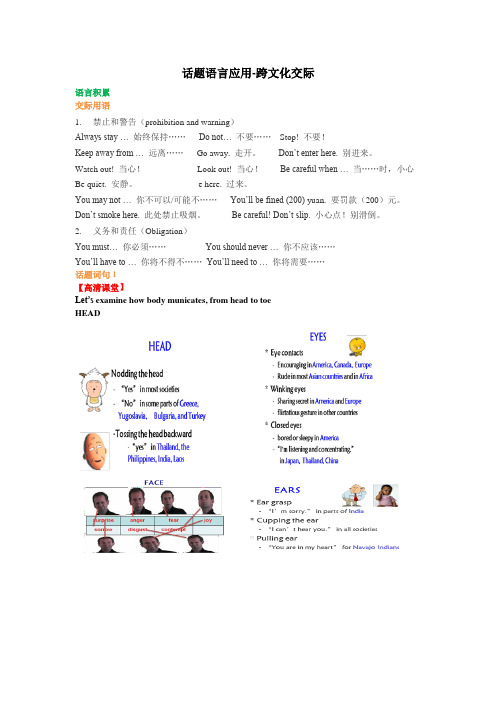
话题语言应用-跨文化交际语言积累交际用语1. 禁止和警告(prohibition and warning)Always stay …始终保持……Do not… 不要……Stop! 不要!Keep away from … 远离……Go away. 走开。
Don’t enter here.别进来。
Watch out! 当心!Look out! 当心!Be careful when … 当……时,小心Be quiet. 安静。
e here. 过来。
You may not … 你不可以/可能不……You’ll be fined (200) yuan. 要罚款(200)元。
Don’t smoke here. 此处禁止吸烟。
Be careful! Don’t slip.小心点!别滑倒。
2. 义务和责任(Obligation)You must… 你必须……You should never … 你不应该……You’ll have to … 你将不得不……You’ll need to …你将需要……话题词句1【高清课堂】Let’s examine how body municates, from head to toeHEAD话题词句2Knowledge about language 有关语言1. Language, in its sense, is a way information is transmitted (传输). It can be spoken or seen.2. How many languages are there in the world?6912 (39,431 distinct有区别的names of languages, dialects, and alternate names)3. Emoticons 情感符:a special Internet language, eg. :-( stands for sadness4. Sign language 手势语5. Facial expressions 面部表情Eye contact 视觉接触6. Braille 布莱叶盲文, invented by a Frenchman, is a language for blind people.7. Gestures:a movement of the hands, arms or head, etc. to express an idea or feeling1)Two people clap their hands together in the air. 击掌---To encourage or congratulate each other 2)A person pats another on the back. 拍另一人背---To say that something is well done3)A person kisses another person on both cheeks. 吻双颊--- To greet or wele people4)A person folds his arms across his chest. 双臂交叉于胸前---To show irritation 恼怒, disagreement or nervousness8. Animal languageLike human beings, animals need to municate with each other to survive. They do not speak to each other in the same way as we do; instead they use many different sounds and actions to express themselves. For example, bees make a buzzing noise, lions and bears growls, cats miaow, and dogs bark. If you see a cat standing with its back arched (拱起), head lowered or legs bent, it could be scared. If a dog growls at you, it probably is angry and you should be careful. Animal language is simpler than human language, but it shows how intelligent animals are.拓展阅读最常见的肢体语言及背后的暗示munication can be fascinating. For most, the exchange ofinformation begins and ends with words. However, there are a lot ofother factors to consider. The tone of voice that a phrase is said in canpletely change the meaning of the phrase. It can turn insults(侮辱)into jokes and jokes into insults. Another way to tell the trueintentions of what someone is saying or doing is to look for bodylanguage indicators.Body language is an interesting concept. The human bodymakes a lot of unconscious motions depending on the situation. Sometimes, the body language indicators are blatant(公开的) and obvious. If you see someone crying, chances are they’re upset about something. Other times, body language indicators aren’t so obvious. For instance, you may pletely miss someone rolling their eyes at you in derision (嘲笑) if they aren’t facing you.There are so many ways to interpret body language and many, many more body language indicators. Below, we’ll show you some of the most popular indicators. These can be important in almost any munication setting (背景), whether it’s business, relationships,or even meeting someone new.1. How close are they?Physical proximity(接近) is a frequently used body language indicator that many peopledon’t notice. If someone is fortable with you, they won’t mind sitting or standing near you. So an interesting way to see if someone actually thinks you’re okay is to go brush shoulders with them. If they back away, you have your answer!2. Downcast (向下的) eyesWe’ll be mentioning a lot of head and eye body language indicators because those are among the most popular and most recognizable(可识别的). One that has been a trend, especially with younger people, is downcast eyes. You’ve seen this, I’ve seen this, and everyone else has too. When someone is unhappy and they try to hide it by, say, smiling, they may betray(泄露) their ruse (计策) by looking downward. This can also be a sign of being unfortable or feeling shameful.3. Restless(不安的,好动的) handsHave you ever seen someone drumming on a desk or a chair with their fingers? What about people playing drums on their legs? This can be a sign of impatience, restlessness, and even sometimes anger. If you’re lecturing your kids and they’re drumming their fingers on the table, chances are you may not really be getting through to them. When you’re speaking with someone and they’re doing this, it’s time to switch tactics(策略).4. Restless legsThis is almost exactly the same as restless hands, except it’s the legs. People may cross and uncross their legs over and over again, tap their foot, or even tap their heels. Have you ever seen someone pacing? Restless legs: they’re e verywhere! Sometimes, people may have restless legs because of restless leg syndrome, and it may not be associated with a feeling. Or they may have to pee really badly.5. Arms crossed!People often misconstrue what crossing arms actually means. People think it means that someone is angry. In fact, it’s actually used as a defensive stance. People who have their arms crossed are unconsciously defending themselves. They may not want to talk anymore or they may be hiding something they don’t want to talk about. But crossing the arms means a person is trying to fort themselves, meaning they’re unfortable.6. Look up for joyWhen an athlete wins a match, scores a point, or does something great, what is the first thing they do? Usually, it’s look straight up. This is a sign of joy, happiness, and relief. It’s true that people can look upward when they’re frustrated, but there are often other indicators that happen before that to show they are frustrated.7. Surprise!This one is pretty obvious but we are talking about popularbody language indicators. When someone widens their eyes or raisestheir eye brows, they’re most often surprised or shocked atsomething. There really aren’t any other reasons why someonewidens their eyes. So this one is not only really popular, but reallyobvious and easy to spot!8. Clearing your throatPeople clear their throat for a variety of reasons. Sometimes you may be ill and you have some stuff stuck back there. However, in a perfectly normal social situation, people often clear the ir throats when they’re nervous or anxious. If you’re watching a stand-up ic and no one is laughing at their jokes, you’ll often see them cough or clear their throat into the ic. It has a seconduse where people use it to show irritation. More often than n ot, though, they’re using it to show that they are unfortable in some capacity.9. Rubbing your eyes can send mixed messagesIf you’re speaking with someone and they remove their glasses, pinch the bridge of their nose, and rub their eyes, they are probably not happy with something you just said. In general use, this body language is used to convey feelings of being tired. This is usually done from a young age, as kids rub their eyes when they’re tired all the time. In adulthood, people who are not happy w ith something will often use that body language to show it.10. StaringSo who remembers high school? In high school, most people were either staring or being stared at, so pretty much everyone is familiar with the stare. Believe it or not, there are two reasons why people stare. Attraction is the main one, as a man or woman may frequently gaze at someone they’re attracted to. However, a lesser known second reason people stare is for dominance. If you’re staring down someone and they’re stari ng back, the first to break the stare is considered to be the less dominant one.写作运用单元写作指导表示关心的信件本单元要求给同学写一封信表示关心。
人教版高中英语选修七Unit2Robots知识讲解话题语言应用——机器人及科幻文学作品
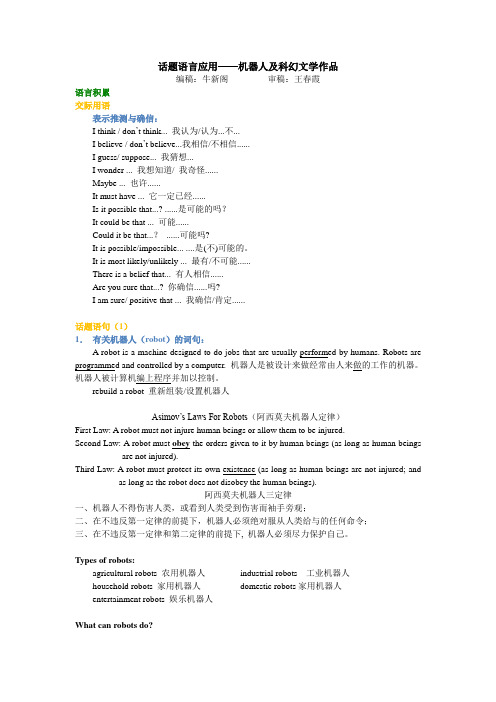
话题语言应用——机器人及科幻文学作品编稿:牛新阁审稿:王春霞语言积累交际用语表示推测与确信:I think / don’t think... 我认为/认为...不...I believe / don’t believe...我相信/不相信......I guess/ suppose... 我猜想...I wonder ... 我想知道/ 我奇怪......Maybe ... 也许......It must have ... 它一定已经......Is it possible that...? ......是可能的吗?It could be that ... 可能......Could it be that...?......可能吗?It is possible/impossible... ....是(不)可能的。
It is most likely/unlikely ... 最有/不可能......There is a belief that... 有人相信......Are you sure that...? 你确信......吗?I am sure/ positive that ... 我确信/肯定......话题语句(1)1.有关机器人(robot)的词句:A robot is a machine designed to do jobs that are usually performed by humans. Robots are programmed and controlled by a computer. 机器人是被设计来做经常由人来做的工作的机器。
机器人被计算机编上程序并加以控制。
rebuild a robot 重新组装/设置机器人Asimov’s Laws For Robots(阿西莫夫机器人定律)First Law: A robot must not injure human beings or allow them to be injured.Second Law: A robot must obey the orders given to it by human beings (as long as human beings are not injured).Third Law: A robot must protect its own existence (as long as human beings are not injured; and as long as the robot does not disobey the human beings).阿西莫夫机器人三定律一、机器人不得伤害人类,或看到人类受到伤害而袖手旁观;二、在不违反第一定律的前提下,机器人必须绝对服从人类给与的任何命令;三、在不违反第一定律和第二定律的前提下, 机器人必须尽力保护自己。
高中英语文学常识大全

高中英语文学常识大全
文学常识是高中英语研究中非常重要的一部分,掌握了这些常
识可以帮助我们更好地理解和欣赏英语文学作品。
以下是一份高中
英语文学常识的大全,希望对大家有所帮助。
1. 文学的定义和特点
- 文学是人类用语言来表达思想和情感的艺术形式。
- 文学作品具有艺术性、感染力和意义深远的特点。
2. 文学流派
- 小说:以故事与人物为基础,展现生活的真实与艺术的完美。
- 诗歌:运用押韵和节奏感表达情感和思想。
- 戏剧:以对话和舞台表演来展示故事和冲突。
3. 文学时代与代表作品
- 文艺复兴时期(14世纪-17世纪):莎士比亚的《哈姆雷特》。
- 浪漫主义时期(18世纪末-19世纪末):雪莱的《奥西安德》。
- 现代主义时期(20世纪初-20世纪中叶):乔伊斯的《尤利西斯》。
4. 文学元素
- 情节:故事的发展和结构。
- 人物:作品中的角色。
- 主题:作品所表达的中心思想。
- 符号:象征和隐喻的使用。
5. 文学技巧
- 比喻:通过比较来传达意义。
- 对比:用不同的元素来展示差异和冲突。
- 感官描写:用五感来刻画形象和氛围。
6. 著名作家与作品
- 莎士比亚:《罗密欧与朱丽叶》、《哈姆雷特》。
- 雪莱:《弗兰肯斯坦》、《奥西安德》。
- 狄更斯:《雾都孤儿》、《双城记》。
以上是一份高中英语文学常识的大全,希望对你的学习有所帮助。
如果你还有其他问题,请随时提问。
高中一轮复习英语课件话题晨背话题十二文学与艺术

○32 a book review ○33 be set in ○34 adapt ...from ... ○35 translate ...into ...
书评 以……为背景 根据……改编…… 把……翻译成……
2.外国著作名称
①The Adventures of Tom Sawyer
《汤姆索亚历险记》
有价值的 现场直播的 要点;大纲 系列 欣赏 宝贵的,珍贵的 艺术品 吸引 逼真 在展览
○28 be open to ○29 range from ...to ... ○30 apply ...to ... ○31 sense of beauty ○32 on show ○33 abstract art ○34 show up ○35 be faced with ○36 have an influence on
反映 欣赏 经典的 独特的 抽象的;深奥的 艺术的 非凡的 生动的 视觉的
⑱valuable adj. ⑲live adj. ⑳outline n.
○21 series n. ○22 appreciate vt. ○23 precious adj. ○24 works of art ○25 appeal to ○26 true to life ○27 on exhibition/display
雕塑,雕刻,雕刻作品,雕像 塑像;雕像 工作间 设计,图案,图样,样式 建设,建筑 建造 壮观的 辉煌的;壮丽的 摩天大楼 水泥
高中英语Unit4Pygmalion知识讲解话题语言应用——文学作品和戏剧教案

高中英语Unit4Pygmalion知识讲解话题语言应用——文学作品和戏剧教案话题语言应用——文学作品和戏剧编稿:牛新阁审稿:王春霞语言积累交际用语1.推测、猜测I wonder whether... 我想是否......I think it’s because... 我想是因为......Is it possible that...? ......是可能吗?Do you know if...? 你知道是否......Perhaps / Maybe,but... 也许,但是......Do you really think that’s true? 你真的认为那是真的吗?2.情感Why do you think Higgins felt like that? 你认为希金斯为什么想要那个/做那件事?How did you feel about your first lesson? 你感觉你的第一节课怎么样?What do you think would make Eliza happier? 你认为什么会让伊莱扎高兴些?Mrs. Pearce would fort / encourage her by... 皮尔斯夫人会通过......来宽慰/鼓励她。
surprised 惊奇的disappointed 失望的worried 担心的confused 糊涂的amazed 吃惊的upset 心烦的sobbing抽泣weeping 哭泣, 流泪 laughing 大笑hesitating 犹豫kindly温和地, 亲切地gently 温和地,慈祥地hopefully 怀有希望地rudely 粗鲁地happily 高兴地unfortably 不自在地gratefully 感激地heartily 尽情地,坚定地proudly 自豪地,傲慢地3.判断与评价You’ve made such progress and... 你已经取得了这么大的进步,而且......The problem was that... 问题是......You were very good with ... 你很擅长...... (be good with sth. 在......有技巧/娴熟)Remember (never) to ... 记住(不)要......All in all,you did very well... 总的来说,你做的很好......I think you just need more practice. 我想你只是需要更多的练习。
高考英语 必考话题分类解析 话题10 文学与艺术(Literaturel Art)(含解析)
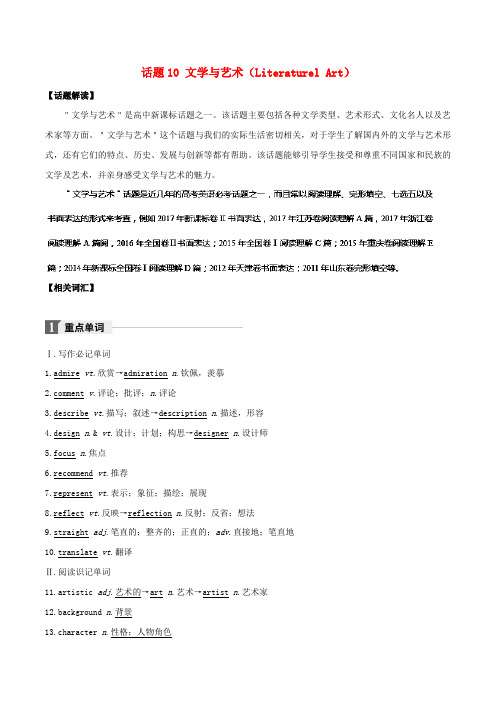
话题10 文学与艺术(Literaturel Art)【话题解读】"文学与艺术"是高中新课标话题之一。
该话题主要包括各种文学类型、艺术形式、文化名人以及艺术家等方面。
"文学与艺术"这个话题与我们的实际生活密切相关,对于学生了解国内外的文学与艺术形式,还有它们的特点、历史、发展与创新等都有帮助。
该话题能够引导学生接受和尊重不同国家和民族的文学及艺术,并亲身感受文学与艺术的魅力。
【相关词汇】Ⅰ.写作必记单词1.admire vt.欣赏→admiration n.钦佩,羡慕ment v.评论;批评;n.评论3.describe vt.描写;叙述→description n.描述,形容4.design n.& vt.设计;计划;构思→designer n.设计师5.focus n.焦点6.recommend vt.推荐7.represent vt.表示;象征;描绘;展现8.reflect vt.反映→reflection n.反射;反省;想法9.straight adj.笔直的;整齐的;正直的;adv.直接地;笔直地10.translate vt.翻译Ⅱ.阅读识记单词11.artistic adj.艺术的→art n.艺术→artist n.艺术家12.background n.背景13.character n.性格;人物角色14.classic adj.经典的15.construction n.建造16.description n.描述,描写17.delicate adj.微妙的;脆弱的;易碎的18.display n.& vt.展示;陈列19.entrance n.入口20.exhibition n.展览;展览会21.extraordinary adj.非凡的22.fiction n.小说;虚构的事23.inspiration n.灵感;启发→inspire vt.鼓舞;启发→inspiring adj.鼓舞人心的24.literature n.文学25.original adj.原创的;n.原作→origin n.起源,开端;出身26.painting n.油画,水彩画27.performance n.表演→perform vt.& vi.表演;做→performer n.表演者28.precious adj.宝贵的,珍贵的29.production n.作品→product n.产品;出品→produce vt.& vi.生产30.publish vt.出版,发行31.remark n.&vt.评论;谈论32.series n.系列33.technique n.技巧34.unique adj.独特的35.valuable adj.有价值的→value n.价值;vt.评价语境活用[用所给词的正确形式填空]1.There are problems psychology doesn’t have the answe r to,and which no words can describe(description).2.Children’s bad behavior is often a reflection(reflect) on their parents.3.A good face is a letter of recommendation(recommend).4.Then go outside and work out a plan to translate(translation) your childhood memories into your grownup garden.(2016·全国Ⅱ)5.Chopsticks are usually two long,thin pieces of wood or bamboo and sometimes they are quite artistic(art). (2016·全国Ⅲ)6.Nurses should recognize their own personal and cultural construction(construct) of s ilence.(2016·全国Ⅰ)7.There are some ways parents can be involved in their kids’ education that leads to declines in their academic performance(perform).(2015·陕西)8.The moral of the original(origin) story is that a devoted person certainly deserves respect.(2014·福建)1.adapt...from...根据……改编……2.apply...to...把……应用于……3.be designed for...为……而设计4.be faced with面对,面临5.be based on以……为根据6.be set in以……为背景7.have an influence on对……有影响8.in the shape of...呈……形状9.on show在展出10.play the role of...扮演(某一角色)11.put on演出,上演12.range from...to...范围从……到……13.show up出现14.translate...into...把……翻译成……15.under construction在建设中1.not only...but also...Some classic works not only offer us joy and excitement,but also encourage us to think critically.一些经典作品不仅能让我们喜悦和兴奋,而且还鼓励我们批判地思考。
人教版高中英语选修七Unit2Robots知识讲解话题语言应用——机器人及科幻文学作品

高中英语学习材料madeofjingetieji话题语言应用——机器人及科幻文学作品编稿:牛新阁审稿:王春霞语言积累交际用语表示推测与确信:I think / don’t think... 我认为/认为...不...I believe / don’t believe...我相信/不相信......I guess/ suppose... 我猜想...I wonder ... 我想知道/ 我奇怪......Maybe ... 也许......It must have ... 它一定已经......Is it possible that...? ......是可能的吗?It could be that ... 可能......Could it be that...?......可能吗?It is possible/impossible... ....是(不)可能的。
It is most likely/unlikely ... 最有/不可能......There is a belief that... 有人相信......Are you sure that...? 你确信......吗?I am sure/ positive that ... 我确信/肯定......话题语句(1)1.有关机器人(robot)的词句:A robot is a machine designed to do jobs that are usually performed by humans. Robots are programmed and controlled by a computer. 机器人是被设计来做经常由人来做的工作的机器。
机器人被计算机编上程序并加以控制。
rebuild a robot 重新组装/设置机器人Asimov’s Laws For Robots(阿西莫夫机器人定律)First Law: A robot must not injure human beings or allow them to be injured.Second Law: A robot must obey the orders given to it by human beings (as long as human beings are not injured).Third Law: A robot must protect its own existence (as long as human beings are not injured; and as long as the robot does not disobey the human beings).阿西莫夫机器人三定律一、机器人不得伤害人类,或看到人类受到伤害而袖手旁观;二、在不违反第一定律的前提下,机器人必须绝对服从人类给与的任何命令;三、在不违反第一定律和第二定律的前提下, 机器人必须尽力保护自己。
人教版高中英语选修3专题一文学作品详细知识点
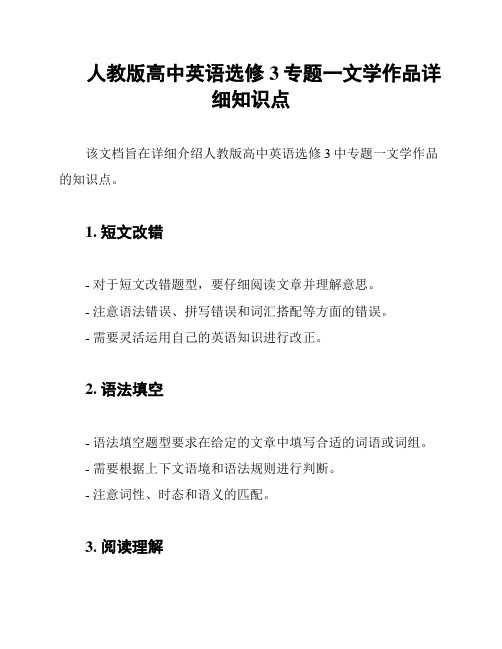
人教版高中英语选修3专题一文学作品详
细知识点
该文档旨在详细介绍人教版高中英语选修3中专题一文学作品的知识点。
1. 短文改错
- 对于短文改错题型,要仔细阅读文章并理解意思。
- 注意语法错误、拼写错误和词汇搭配等方面的错误。
- 需要灵活运用自己的英语知识进行改正。
2. 语法填空
- 语法填空题型要求在给定的文章中填写合适的词语或词组。
- 需要根据上下文语境和语法规则进行判断。
- 注意词性、时态和语义的匹配。
3. 阅读理解
- 阅读理解题型要求通过阅读文章来回答问题。
- 需要注意文章的主旨、细节和推断等方面的问题。
- 可以通过划线标记关键信息,以便在回答问题时快速找到相
关信息。
4. 完形填空
- 完形填空题型要求在给定的文章中填写合适的词语。
- 需要理解文章的整体意思和上下文之间的逻辑关系。
- 注意词性、时态和语义的匹配。
5. 词汇与语法
- 通过研究文学作品,可以积累丰富的词汇和语法知识。
- 需要记忆和掌握各类重要词汇和常见语法规则。
- 可以通过做题和阅读更多的文学作品来提升自己的语言水平。
以上是人教版高中英语选修3专题一文学作品的详细知识点。
希望对你的研究有所帮助!。
高中英语必修三《英语与文学》必备知识点整合

高中英语必修三《英语与文学》必备知识点整合本文将整合高中英语必修三《英语与文学》的必备知识点,帮助学生更好地理解和掌握这门课程。
Unit 1: Literature1. Literary Genres:- Fiction: includes novels, short stories, and plays.- Non-fiction: includes biographies, autobiographies, and essays.2. Elements of Fiction:- Characterization: the development of characters in a story.- Plot: the sequence of events in a story.- Theme: the main idea or message conveyed in a story.- Setting: the time and place in which a story takes place.- Point of View: the perspective from which a story is told.3. Literary Devices:- Personification: giving human qualities to non-human objects or ideas (e.g., "The wind whispered through the trees").Unit 2: Poetry1. Types of Poetry:- Sonnet: a 14-line poem with a specific rhyme scheme.- Haiku: a traditional Japanese poem consisting of three lines with a specific syllable pattern.- Free Verse: poetry without a regular rhyme or meter.2. Poetic Devices:- Rhyme: the repetition of similar sounds at the end of words.- Meter: the rhythmic pattern in poetry.- Alliteration: the repetition of consonant sounds at the beginning of words.3. Poetic Forms and Structures:- Stanza: a group of lines in a poem.- Refrain: a repeated phrase or line in a poem.- Enjambment: the continuation of a sentence without pause beyond the end of a line.Unit 3: Drama1. Types of Drama:- Tragedy: a serious play with a tragic ending.2. Elements of Drama:- Dialogue: the conversation between characters in a play.- Stage Directions: instructions for actors and stage crew.- Monologue: a long speech by one character.3. Play Structure:- Acts: the major divisions of a play.- Scenes: smaller divisions within acts.这些知识点将帮助学生更好地理解和分析高中英语必修三《英语与文学》中的文学作品、诗歌和戏剧,为学习和阅读提供指导和帮助。
人教版高中英语选修六Unit2Poem语言应用话题语言应用——诗歌
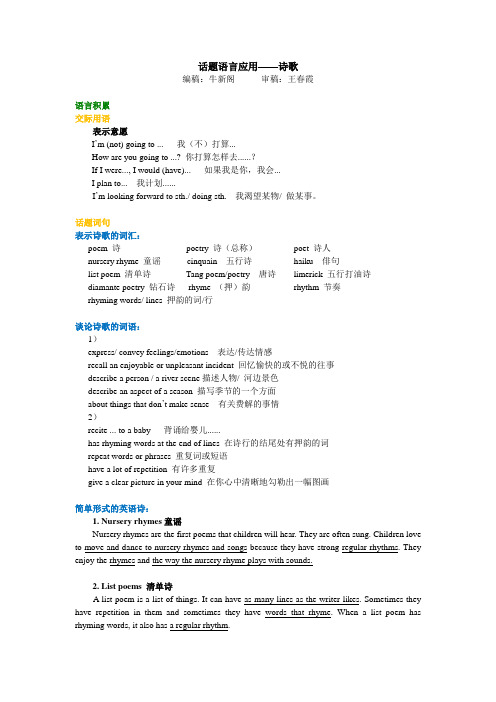
话题语言应用——诗歌编稿:牛新阁审稿:王春霞语言积累交际用语表示意愿I’m (not) going to ... 我(不)打算...How are you going to ...? 你打算怎样去......?If I were..., I would (have)... 如果我是你,我会...I plan to... 我计划......I’m looking forward to sth./ doing sth.我渴望某物/ 做某事。
话题词句表示诗歌的词汇:poem 诗poetry 诗(总称)poet 诗人nursery rhyme 童谣cinquain 五行诗haiku 俳句list poem 清单诗Tang poem/poetry 唐诗limerick 五行打油诗diamante poetry 钻石诗rhyme (押)韵rhythm 节奏rhyming words/ lines 押韵的词/行谈论诗歌的词语:1)express/ convey feelings/emotions 表达/传达情感recall an enjoyable or unpleasant incident 回忆愉快的或不悦的往事describe a person / a river scene描述人物/ 河边景色describe an aspect of a season 描写季节的一个方面about things that don’t make sense 有关费解的事情2)recite ... to a baby 背诵给婴儿......has rhyming words at the end of lines 在诗行的结尾处有押韵的词repeat words or phrases 重复词或短语have a lot of repetition 有许多重复give a clear picture in your mind 在你心中清晰地勾勒出一幅图画简单形式的英语诗:1. Nursery rhymes童谣Nursery rhymes are the first poems that children will hear. They are often sung. Children love to move and dance to nursery rhymes and songs because they have strong regular rhythms. They enjoy the rhymes and the way the nursery rhyme plays with sounds.2. List poems 清单诗A list poem is a list of things. It can have as many lines as the writer likes. Sometimes they have repetition in them and sometimes they have words that rhyme. When a list poem has rhyming words, it also has a regular rhythm.清单诗可长可短,可以重复一些词语,较为灵活。
高英文化常识

高英文化常识
高英文化常识是指高级英语中涉及到的文化背景知识和语言运用能力。
以下是几个高英文化常识的例子:
1. 文学作品中的文化背景:高级英语中会涉及到许多世界名著和文学作品,这些作品所反映的时代背景、社会现象和文化传统等方面的知识需要进行了解。
例如,阅读《红楼梦》需要了解清朝时期的中国社会和文化背景。
2. 文化价值观和传统文化:高级英语中经常涉及到一些文化价值观和传统文化,例如西方文化中的个人主义、自由主义和基督教文化等。
需要对这些文化价值观和传统文化进行深入了解,以便更好地理解文学作品中的思想和情感。
3. 语言表达和文化习俗:高级英语中会涉及到一些特殊的语言表达和文化习俗,例如英语中的委婉语、俚语和修辞手法等。
需要对这些语言表达和文化习俗进行了解,以便更好地理解文学作品中的语言运用和表达方式。
4. 历史事件和文化名人:高级英语中会涉及到一些历史事件和文化名人,例如文艺复兴时期的达芬奇、启蒙运动时期的伏尔泰等。
需要对这些历史事件和文化名人进行了解,以便更好地理解文学作品中的历史背景和文化内涵。
总之,高英文化常识的涵盖面非常广泛,涉及到文学、历史、文化、价值观等多个方面。
需要对这些方面进行深入了解,以便更好地理解高级英语中的文化内涵和思想情感。
高中英语文学阅读课
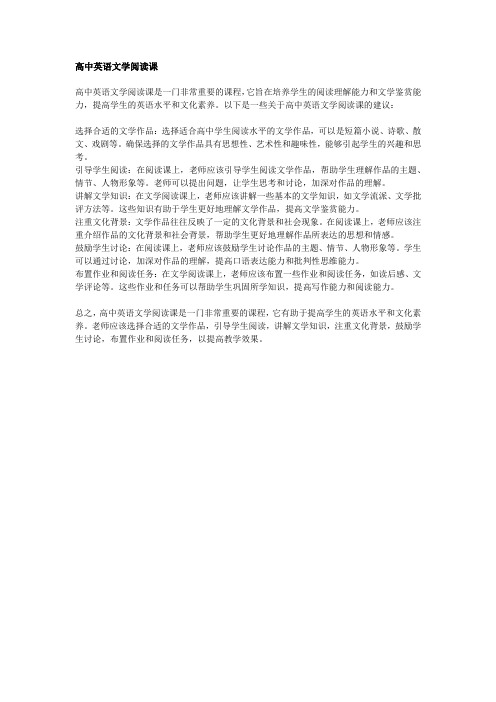
高中英语文学阅读课
高中英语文学阅读课是一门非常重要的课程,它旨在培养学生的阅读理解能力和文学鉴赏能力,提高学生的英语水平和文化素养。
以下是一些关于高中英语文学阅读课的建议:
选择合适的文学作品:选择适合高中学生阅读水平的文学作品,可以是短篇小说、诗歌、散文、戏剧等。
确保选择的文学作品具有思想性、艺术性和趣味性,能够引起学生的兴趣和思考。
引导学生阅读:在阅读课上,老师应该引导学生阅读文学作品,帮助学生理解作品的主题、情节、人物形象等。
老师可以提出问题,让学生思考和讨论,加深对作品的理解。
讲解文学知识:在文学阅读课上,老师应该讲解一些基本的文学知识,如文学流派、文学批评方法等。
这些知识有助于学生更好地理解文学作品,提高文学鉴赏能力。
注重文化背景:文学作品往往反映了一定的文化背景和社会现象。
在阅读课上,老师应该注重介绍作品的文化背景和社会背景,帮助学生更好地理解作品所表达的思想和情感。
鼓励学生讨论:在阅读课上,老师应该鼓励学生讨论作品的主题、情节、人物形象等。
学生可以通过讨论,加深对作品的理解,提高口语表达能力和批判性思维能力。
布置作业和阅读任务:在文学阅读课上,老师应该布置一些作业和阅读任务,如读后感、文学评论等。
这些作业和任务可以帮助学生巩固所学知识,提高写作能力和阅读能力。
总之,高中英语文学阅读课是一门非常重要的课程,它有助于提高学生的英语水平和文化素养。
老师应该选择合适的文学作品,引导学生阅读,讲解文学知识,注重文化背景,鼓励学生讨论,布置作业和阅读任务,以提高教学效果。
【词汇讲解】Module3Literature知识详解外研版高中选修7
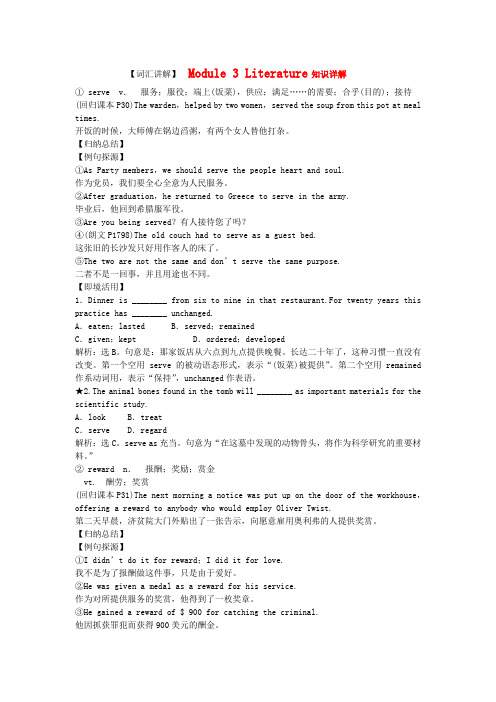
【词汇讲解】Module 3 Literature知识详解① serve v.服务;服役;端上(饭菜),供应;满足……的需要;合乎(目的);接待(回归课本P30)The warden,helped by two women,served the soup from this pot at meal times.开饭的时候,大师傅在锅边舀粥,有两个女人替他打杂。
【归纳总结】【例句探源】①As Party members,we should serve the people heart and soul.作为党员,我们要全心全意为人民服务。
②After graduation,he returned to Greece to serve in the army.毕业后,他回到希腊服军役。
③Are you being served?有人接待您了吗?④(朗文P1798)The old couch had to serve as a guest bed.这张旧的长沙发只好用作客人的床了。
⑤The two are not the same and don’t serve the same purpose.二者不是一回事,并且用途也不同。
【即境活用】1.Dinner is ________ from six to nine in that restaurant.For twenty years this practice has ________ unchanged.A.eaten;lasted B.served;remainedC.given;kept D.ordered;developed解析:选B。
句意是:那家饭店从六点到九点提供晚餐。
长达二十年了,这种习惯一直没有改变。
第一个空用serve的被动语态形式,表示“(饭菜)被提供”。
第二个空用remained 作系动词用,表示“保持”,unchanged作表语。
- 1、下载文档前请自行甄别文档内容的完整性,平台不提供额外的编辑、内容补充、找答案等附加服务。
- 2、"仅部分预览"的文档,不可在线预览部分如存在完整性等问题,可反馈申请退款(可完整预览的文档不适用该条件!)。
- 3、如文档侵犯您的权益,请联系客服反馈,我们会尽快为您处理(人工客服工作时间:9:00-18:30)。
话题语言应用--文学编稿:张桂琴审稿:梁晓语言积累交际用语1.请求(Requests)Would you (please)…?请……好吗?I wonder if you mind…我想知道你会不会介意……May we ask…? 我们能问……吗?Could you …? 你能……吗?If you don’t mind ,may I… ?如果你不介意我可以……吗?Please don’t …请不要……2.点餐(Ordering food)Can I help you? 请问我能帮你做点儿什么?I’ll take your order in a minute.我马上就为你下单。
Are you ready to order ,sir/madam? 先生/女士,您现在就准备点餐吗?What would you like…? 你喜欢吃什么?Enjoy your meal !用餐快乐!Here is your bill. 这是你的账单。
Here you are. 这是给你的。
I’d like…我喜欢。
I’ll have…我想吃……Do you have …?你们这儿有……吗?What do you suggest? 你推荐我们吃什么?I’ll have that. 我要吃那个。
The bill ,please. 请买单。
Can I have the check, please? 我能看下账单吗?3.购物(Shopping)I’d like to have …我要买……I’m looking for …我正在寻找……Do you have any …? 你这儿有……吗Can you show me…,please? 给我看一下……好吗?May I try it on? 我可以试一下吗?Do you have any other…? 你还有其他……的吗?How much is it/ are they? 它/它们多少钱?Well ,I think about it. 我考虑考虑。
Just have a look. 仅仅看一下。
I’ll take it. 我买了。
That’s it. 就买这个了。
May/Can I help you? 我能帮你什么吗?What can I do for you ?我能为你做点什么?What about this one? 这个怎么样?Did you find everything ok? 你感觉这些行吗?Is that everything? 就那些吗?That’s all we have. 那就是我们所要买的。
话题词句【高清课堂:话题应用】I. Get to know foreign currencyeuro, pound, dollar, ruble,yen, won, Australian dollar,Canadian dollar, Swiss FrancAmerica,Britain,Japan,Australia,Canada,Russia,Korea,Switzerland,GermanyII. Your house of life 你生活的大屋Perhaps you think you could easily add to your happiness with more money. Strange as (虽然) it may seem, if you're unsatisfied, the issue is not a lack of means to meet your desires but alack of desires—not that you cannot satisfy your tastes but that you don't have enough tastes.Real riches consist of well-developed and hearty capacities (能力) to enjoy life. Most people are already swamped (淹没) with things. They eat, wear, go and talk too much. They live in too big a house with too many rooms, yet their house of life is a hut.Your house of life ought to be a mansion (豪宅), a royal palace. Every new taste, every additional interest, every fresh enthusiasm adds a room. Here are several rooms your house of life should have.Art should be a desire for you to develop simply because the world is full of beautiful things. If you only understood how to enjoy them and feed your spirit on them, they would make you as happy as to find plenty of ham and eggs when you're hungry. (注:此if从句是虚拟语气,注意if从句的谓语understood和主句谓语would make的形式变化)Literature, classic literature, is a beautiful, richly furnished room where you might find many an hour of rest and refreshment. To gain that love would go toward making you a rich person, for a rich person is not someone who has a library but who likes a library.Music like Mozart's and Bach's shouldn't be absent. Real riches are of the spirit. And when you've brought that spirit up to where classical music feeds it and makes you a little drunk, you have increased your thrills and bettered them. And life is a matter of thrills.Sports, without which you remain poor, mean a lot in life. No matter who you are, you would be more human, and your house of life would be better supported against the bad days, if you could, and did, play a bit.Whatever rooms you might add to your house of life, the secret of enjoying life is to keep adding.III. A story of Mark Twain(2016 福建厦门翔安一中期中)Mark Twain was a great writer. He was from the USA. He was born in 1835. He was also a famous speaker. He was famous for his sense of humor. Many people liked to listen to him talk because he liked to tell some interesting stories to make people laugh all the time.One day Mark Twain was going to a small town because of his writing. Before he was going to leave, one of his friends said to him that there were always a lot of mosquitoes in the town and told him that he’d better not go there. Mark Twain waved his hand and said, “It doesn’t matter. The mosquitoes are no r elatives of mine. I don’t think they will e to visit me.”After he arrived at the town, Mark Twain stayed in a small hotel near the station. He went into his room, but when he was just about to have a rest, quite a few mosquitoes flew about him. The waiter s felt very sorry about that. “I’m very sorry, Mr. Mark Twain. There are too many mosquitoes in our town.” One of them said to him.Mark Twain, however, made a joke, saying to the waiter, “The mosquitoes are very clever. They know my room number. They did n’t e into the wrong room.” What he said made all the people present laugh heartily.But that night Mark Twain slept well. Do you know why? That was because all the waiters in the hotel were driving the mosquitoes away for him during the whole night.拓展阅读(2015北京东城期末)THE BRONTE FAMILY 勃朗特一家Yorkshire, England was the setting for two great novels of the 19th century. One of them is Jane Eyre written by Charlotte Bronte. The Bronte family had three girls and a boy. Charlotte was born in 1816, Emily was born in 1818 and Anne in 1820. Their brother Branwell was born in 1817. The children wrote and told stories and walked over the hills. They grew up largely self-educated. Branwell showed a great interest in drawing. The girls took positions as teachers or taught children in their homes. The girls were determined to earn money for Branwell's art education.As children, the girls had all written many stories. Charlotte alone wrote 22 books, each with 60 to 100 pages of small handwriting. Therefore, they turned to writ ing for ine. By 1847, Charlotte had written The Professor; Emily, Wuthering Heights; and Anne, Agnes Grey. After much difficulty, Anne and Emily found a publisher (出版商), but there was no interest shown in Charlotte's book. ( It was not published until 1859. ) However, one publisher expressed an interest in seeing more of her work. Jane Eyre was already started, and she hurriedly finished it. It was accepted at once; thus each of the sisters had a book published in 1847.Jane Eyre was immediately successful; the other two, however, did not do so well. Emily lived only a short while after the publication of her book, and Anne died in 1849.Charlotte published Shirley in 1849, and Villette in 1853. In 1854 she married Arthur Bell Nicholls. But only a year later, she died of tuberculosis (肺结核) as her sisters had.写作运用写作指导:应用文——书信英文书信一般分为商业信函(Business Letters)和私人书信(Personal Letters)两种,而高考书面表达一般都是要求写私人书信。
